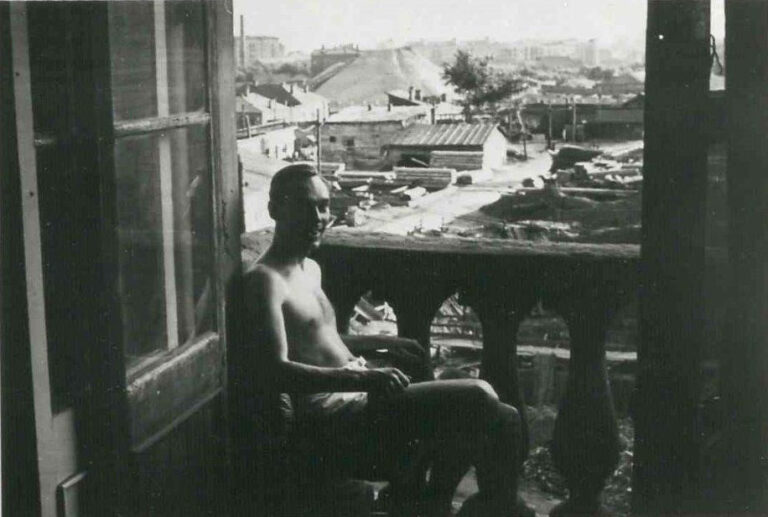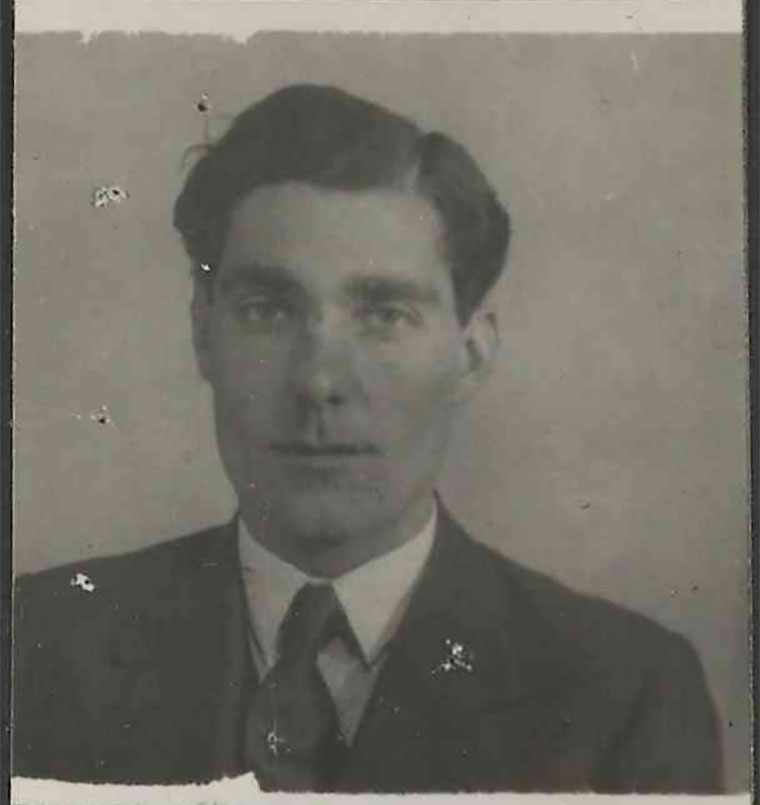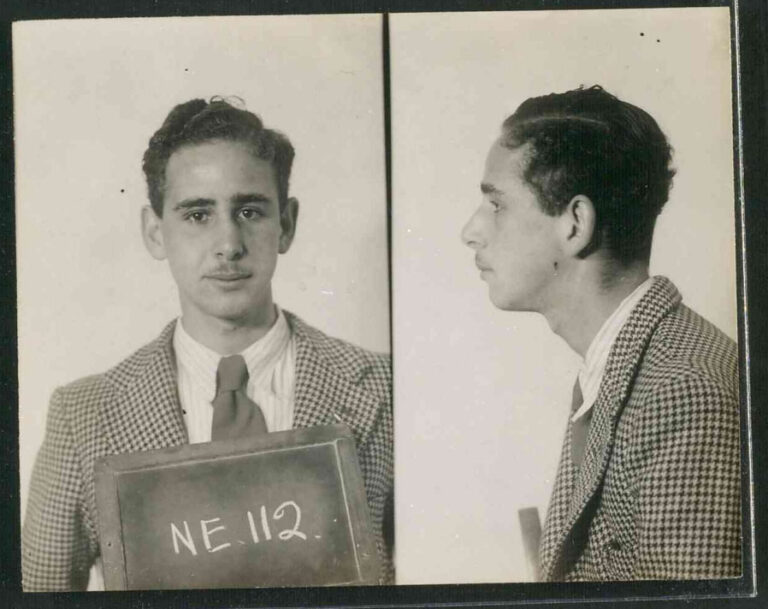Today we have released 147 MI5 files, mostly from the 1960s and 1970s, with some files from earlier years. They have all been digitised and can be downloaded from Discovery, our catalogue.
As ever, the newly-released files provide us with a greater understanding of MI5’s concerns, and add layers to sometimes well-known stories.
John Vassall – a ‘social climber’?
In 1962, civil servant John Vassall was sentenced to 18 years’ imprisonment for espionage. Vassall was homosexual, and while working in a clerical position at the British Embassy in Moscow (1954-56), was caught in a KGB ‘honeytrap’ in which compromising photos were taken of him.

Vassall was blackmailed into passing secrets to the Soviet Union, receiving payments for his efforts. He had then continued with his spying activity when he returned to Britain. This was one of a series of security scandals that rocked the Macmillan government in the early 1960s, feeding into a national obsession with spy culture at the time.
While there are no dramatic revelations, the files add rich layers of detail to the known story. There are some aspects which struck me as particularly significant.
The files reveal the extent of the paranoia which developed surrounding gay men working in government services. The Security Service was constantly probing and then deliberating as to ‘was such and such a person homosexual?’ with a sharp focus on this angle if the acquaintance worked in government service in the UK or for another government, including the USA and Canada.
The relentless, repetitive pursuit of such enquiries is a striking feature of the files. Vassall’s story reinforced the notion that homosexuals were seen as security risks because of their vulnerability to blackmail. At this time (referring to Britain), homosexual relations between men were illegal and the subject of widespread prejudice.
We see the full extent of John Vassall’s social engagements during his Moscow days (1954-56), a schedule that is so busy it is mind-boggling. He seems to have lived the life of a top diplomat rather than a clerical officer. Several of his acquaintances, when interviewed about Vassall, describe him as a ‘social climber’.
We also learn fascinating details about the MI5 surveillance operation mounted against Vassall in the autumn of 1962, the staking out of his luxuriously decorated flat in Dolphin Square, Pimlico (he was clearly living way beyond his means as a clerical officer), the interception of his post and the bugging of his phone calls.
There are many detailed accounts of interviews with Vassall undertaken by MI5 officers when Vassall was in prison. The most remarkable of these dates from 1971; in this interview it is clear that, despite everything he has gone through, Vassall still greatly admires one of his former KGB controllers, setting great store on being ‘understood’ by him. This underlines the cleverness of his Russian masters, who developed a paternal relationship with him.
Fred Warner – ‘Less than frank’?
Frederick (Fred) Warner was close a friend of Guy Burgess. His file doesn’t reveal anything dramatically new, but adds a bit of colour – new layers to the well-known story of the Cambridge Five (you can read more about them in the blog post ‘Burgess and Maclean: Revelations’).

According to his initial statement, Warner only really became close to Burgess in 1948, when they shared an office at the Foreign Office where they were both working for Minister of State Hector McNeil. Having worked in the same room every single day for a year, Warner didn’t seem to have a particularly high opinion of Burgess’s abilities. Burgess was, he stated, ‘quite incapable of managing the day-to-day business of the Minister’s routine’ and, when finally trusted to accompany a delegation to Paris, ‘he was no help at all, in fact a nuisance’. He also reported Burgess’s tendency to ‘lean for advice upon his friends’ and promptly disregard said advice.
The file gives Warner’s version of an incident that took place in 1948. Quite a few people, notably Anthony Blunt, thought Warner had ‘slung Burgess down some stairs’, after a heavy drinking session in the upstairs bar of a pub. After his fall, Burgess, suffering from concussion, went to hospital for six weeks, took to drinking quite heavily, and started taking large doses of codeine. Warner had ‘no recollection’ of having pushed Burgess – nor of having attempted to break his fall.
‘It is not the business of this service,’ it was noted in 1952, ‘to settle the question of the rightness or wrongness of the homosexual charges made against Warner.’ Yet, just like Vassall’s, Warner’s file has a strong focus on his sexual orientation. Pointing out that he was ‘not by any means a typical homosexual’, it details the numerous checks conducted by the Security Service into Warner’s love life (or lack thereof) at the time of Burgess’s disappearance, but also every time he was about to be promoted. This adds to what we already know about how homosexuality was regarded at the time.
In the end, even though they suspected Warner had been ‘less than frank’, had tried to downplay his friendship with Burgess, and probably used to be a homosexual, MI5 concluded he wasn’t a security risk.
Irwin Sanders – An intelligence nuisance
Among the files from the earlier period is that of one Irwin Henry Richard Sanders. It tells the (quite literally) incredible story of Dutchman Irwin Sanders, who arrived in the UK in 1941.

‘He came over to this country telling a most dramatic tale of his escape from the Gestapo in Holland’, the file tells us, ‘in the course of which he claimed to have bayoneted no less than 30 Huns’. Sanders actually produced the bayonet as evidence, but when it was tested, it turned out not to display any trace of blood.
It is obvious from the long file (three volumes) that the Security Service didn’t quite know what to make of this young man who turned up in Gibraltar in the uniform of a Hitler Youth leader, claiming to have just crossed France and Spain and to be a Dutch officer.
His already rather shaky story kept changing. Was he a Nazi spy? He was interned as enemy alien while MI5 tried to determine which of the five accounts of his journey to the UK might contain a modicum of truth.
Having made a nuisance of himself at HMP Brixton by disseminating Nazi propaganda, he was sent to the Isle of Man. There, he continued to misbehave and tried several times to escape, while constantly asking to be allowed to join the British Army, the American forces, or, in 1945, the British administration in Occupied Germany. He was finally deported in July 1945.
He resurfaced in the 1950s under the name of Richard Sandys, carrying a British passport and working at the Demerara Bauxite Company in British Guiana, where he managed to get a job by claiming he had served with the British Intelligence Corps in the Netherlands during the war.
So, was he a spy? According to the file, ‘this theory was rejected on the basis that although the German Intelligence Service did strange things, they would never put up an agent to tell the sort of story Sanders put across’.
Was he just a ‘pathological liar’, as one officer put it? The file reads like a not-too-plausible espionage novel, by the end of which one is left none the wiser. Having kept MI5 busy trying to cross-reference and double-check his wild tales, Sanders was the perfect example of an intelligence nuisance.
It is surprising that TNA have decided not to mention the files just released on the Krogers and Stephen Ward. Of course the ‘release’ of these files does not mean all of the documents have been released.
The interest of the MI5 vetting interview officers – those who would have done the interviews of Walker and his colleagues – wasn’t just in homosexuality per se.
They (and the vetting team who made the decisions based on their reports) were interested in anything that the subject would regard as needing to be hidden – drug or alcohol problems, extramarital affairs, money problems etc – as the desire to keep such things hidden would provide an obvious blackmail lever.
Of course given what we know of the fact that (male) homosexuality was illegal and considered ‘unmanly’ in large sections of society during the period examined above there is no doubt that a degree of personal bias crept into the questioning and the subsequent review of the information gleaned.
The interviewee was always going to be at a potential disadvantage as the interviewers – often former police officers – would seek to build a climate of ‘trust’ (often using such methods as ‘tell me the unreserved truth and if you do so you have nothing to fear’).
Naturally, such a process is a ‘damned if you do, damned if you don’t’ one for some.
Doing what was asked and answering the type of personal questions demanded by the process would leave the interviewee open to having their answers recorded and interpreted later with consequences that the honest interviewee may not have anticipated.
I do not wish to be ungrateful but the drip feeding of these files makes one wonder why they could not have been released at the end of the Cold War. Instead we proceed at a snail’s pace.
It would help if the numbers of these files, i.e. KV2 … would be listed thus making it easier to find them!
A vetting interview is not an interrogation; it is only a search for vulnerabilities in your personal situation that might, in the right circumstances, tempt you to pass information to those who shouldn’t have it. Not to reveal something while being vetted is asking for trouble (‘If he didn’t tell us about this, what else has he been hiding?’). Instant withdrawal of clearance followed by loss of job.
One of the disadvantages of working in a job where you have access to classified material is that you necessarily have to give up the right to privacy in your personal affairs. Nobody forces you to apply for such jobs; if there are things you wish to keep to yourself, look elsewhere for employment.
Excellent that the National Archives have released this material – and please keep it coming – but why are the links (or at least reference numbers) to the actual documents mentioned in the press releases / blogs so difficult to find? It is almost as if you want to build a protective wall around the original material, pre-interpting its meaning for us, rather than enabling the reader to go straight there and make his or her judgement. As it happens, I knew one of the people featured, Sir Fred Warner, quite well in the 1980s, so my interest is more than just academic, but I am still looking for the file that is alluded to in your blog piece…
All rather sad that the British state and British society was so full of prejudice at that time (and still is to some extent). One of the worst consequences was the treatment of Alan Turing.
I think homosexuals are legitimately gay. I genuinely believe they can, and do love other men. Now that homosexuality is an accepted truth, are these files some kind of propaganda for the LGBT™ community? Everything in Britain is rainbow flags galore these days. It is quite unsettling. If people are homosexual, ok then, but should this be primary criteria for every single topic and subject matter? I thought I was about to read an article about spies. Felt like I was reading some pro LGBT propaganda. it is quite tiresome. Why is sexual orientation such a key factor in public discussion these days?
Here is a link to the search results in Discovery showing all the 147 KV files that were released on 11 October 2022, which should be in reference order: https://discovery.nationalarchives.gov.uk/results/r?_srt=1&_aq=*&_cr=KV&_dss=range&_l=6%7C7&_rd=11%2F10%2F2022&_ro=date&_hb=tna&_st=adv
If this link doesn’t work on this screen please try copying it and pasting it into your browser
have the files on George Blake been released yet? I am interested in his time in Berlin 1950s-1960’s.
Thank you,
Pat Vinycomb
Vassal and cronies article showed no reference to Astor Club as observed in early 60″s.
I would love to see the MI5 debriefs of the refugees and the interned recalcitrant French sailors held at Crystal Palace Park in 1940.
Maybe one day they will be released…
Thank you for these “hidden” files.
Are there files available for the UK intelligence services from WW 1? I had an aunt who worked there deciphering German documents and messages. Prior to the War, she had been an au pair for a German military officer, who helped her leave there as the clouds of war were gathering. I assume she learned her German then. The family has only one memento of that work from her – a dictionary of classical script German.
Thank you for your comments. If you have an enquiry about the records we hold, the best thing to do is to use our email enquiry form so it can be considered by our team of record specialists.
Have you got a file on Bulgarian Communist Nicolas Gargov (alt spelling Nicholas Gargoff)? He was one of the last Brigadistas to leave Republican Spain in 1939. Later on, he moved to Britain where he started broadcasting to Nazi-dominated Bulgaria. I am not sure whether he worked for the BBC or a “black propaganda” radio station. He was my wife’s uncle but, unfortunately, he didn’t leave any memoirs. He had a lot of problems for having been on British payroll but managed to put that behind and became a trade representative of Communist Bulgaria to Cuba and Chile (till 1973).
I wish to see the MI5 files on Victor Rothschild, the Third Baron. He was investigated eleven times in the 1950s and 1960s because of his close association with Anthony Blunt, Guy Burgess, Donald Maclean and Kim Philby. I am updating my book, THE FIFTH MAN, published by Sidgwick & Jackson, and Pan Macmillian in 1994.
Any assistance would be greatly appreciated.
Thank you,
Faithfully Yours,
Professor Roland Perry
Dear Roland,
Thank you for your comment.
To ask questions relating to research, please use our live chat or online form.
We hope you might also find our research guides helpful.